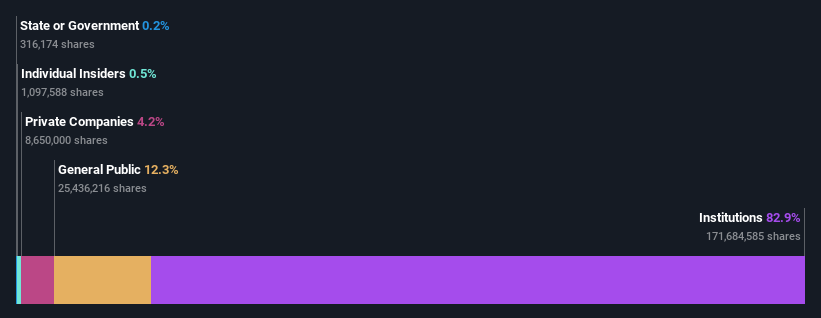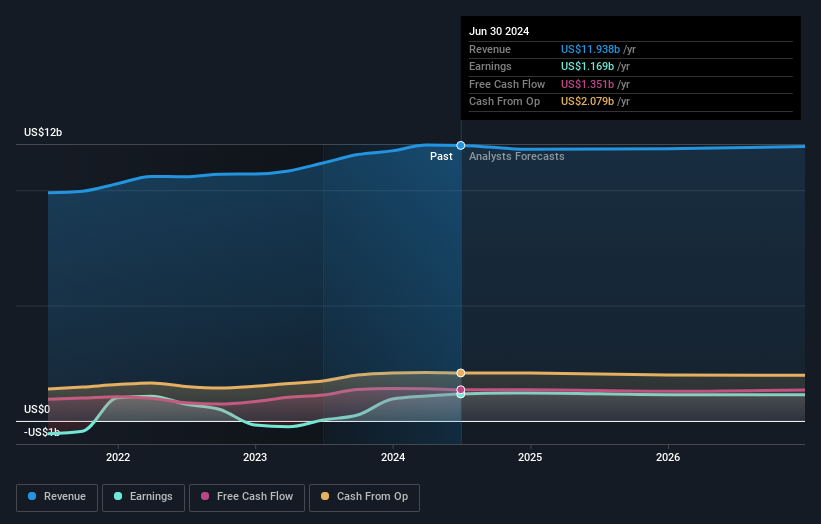After losing 9.7% in the past year, Molson Coors Beverage Company (NYSE:TAP) institutional owners must be relieved by the recent gain
Key Insights
Institutions' substantial holdings in Molson Coors Beverage implies that they have significant influence over the company's share price
50% of the business is held by the top 14 shareholders
Using data from analyst forecasts alongside ownership research, one can better assess the future performance of a company
If you want to know who really controls Molson Coors Beverage Company (NYSE:TAP), then you'll have to look at the makeup of its share registry. We can see that institutions own the lion's share in the company with 83% ownership. In other words, the group stands to gain the most (or lose the most) from their investment into the company.
Last week's US$373m market cap gain would probably be appreciated by institutional investors, especially after a year of 9.7% losses.
Let's delve deeper into each type of owner of Molson Coors Beverage, beginning with the chart below.
View our latest analysis for Molson Coors Beverage
What Does The Institutional Ownership Tell Us About Molson Coors Beverage?
Institutions typically measure themselves against a benchmark when reporting to their own investors, so they often become more enthusiastic about a stock once it's included in a major index. We would expect most companies to have some institutions on the register, especially if they are growing.
Molson Coors Beverage already has institutions on the share registry. Indeed, they own a respectable stake in the company. This implies the analysts working for those institutions have looked at the stock and they like it. But just like anyone else, they could be wrong. It is not uncommon to see a big share price drop if two large institutional investors try to sell out of a stock at the same time. So it is worth checking the past earnings trajectory of Molson Coors Beverage, (below). Of course, keep in mind that there are other factors to consider, too.
Since institutional investors own more than half the issued stock, the board will likely have to pay attention to their preferences. We note that hedge funds don't have a meaningful investment in Molson Coors Beverage. The Vanguard Group, Inc. is currently the company's largest shareholder with 11% of shares outstanding. The second and third largest shareholders are Dodge & Cox and BlackRock, Inc., with an equal amount of shares to their name at 7.0%.
A closer look at our ownership figures suggests that the top 14 shareholders have a combined ownership of 50% implying that no single shareholder has a majority.
Researching institutional ownership is a good way to gauge and filter a stock's expected performance. The same can be achieved by studying analyst sentiments. Quite a few analysts cover the stock, so you could look into forecast growth quite easily.
Insider Ownership Of Molson Coors Beverage
The definition of an insider can differ slightly between different countries, but members of the board of directors always count. Management ultimately answers to the board. However, it is not uncommon for managers to be executive board members, especially if they are a founder or the CEO.
I generally consider insider ownership to be a good thing. However, on some occasions it makes it more difficult for other shareholders to hold the board accountable for decisions.
Our most recent data indicates that insiders own less than 1% of Molson Coors Beverage Company. But they may have an indirect interest through a corporate structure that we haven't picked up on. It is a very large company, so it would be surprising to see insiders own a large proportion of the company. Though their holding amounts to less than 1%, we can see that board members collectively own US$61m worth of shares (at current prices). It is always good to see at least some insider ownership, but it might be worth checking if those insiders have been selling.
General Public Ownership
The general public, who are usually individual investors, hold a 12% stake in Molson Coors Beverage. While this size of ownership may not be enough to sway a policy decision in their favour, they can still make a collective impact on company policies.
Private Company Ownership
We can see that Private Companies own 4.2%, of the shares on issue. It might be worth looking deeper into this. If related parties, such as insiders, have an interest in one of these private companies, that should be disclosed in the annual report. Private companies may also have a strategic interest in the company.
Next Steps:
I find it very interesting to look at who exactly owns a company. But to truly gain insight, we need to consider other information, too. Take risks for example - Molson Coors Beverage has 3 warning signs (and 1 which is a bit unpleasant) we think you should know about.
Ultimately the future is most important. You can access this free report on analyst forecasts for the company.
NB: Figures in this article are calculated using data from the last twelve months, which refer to the 12-month period ending on the last date of the month the financial statement is dated. This may not be consistent with full year annual report figures.
Have feedback on this article? Concerned about the content? Get in touch with us directly. Alternatively, email editorial-team (at) simplywallst.com.
This article by Simply Wall St is general in nature. We provide commentary based on historical data and analyst forecasts only using an unbiased methodology and our articles are not intended to be financial advice. It does not constitute a recommendation to buy or sell any stock, and does not take account of your objectives, or your financial situation. We aim to bring you long-term focused analysis driven by fundamental data. Note that our analysis may not factor in the latest price-sensitive company announcements or qualitative material. Simply Wall St has no position in any stocks mentioned.

